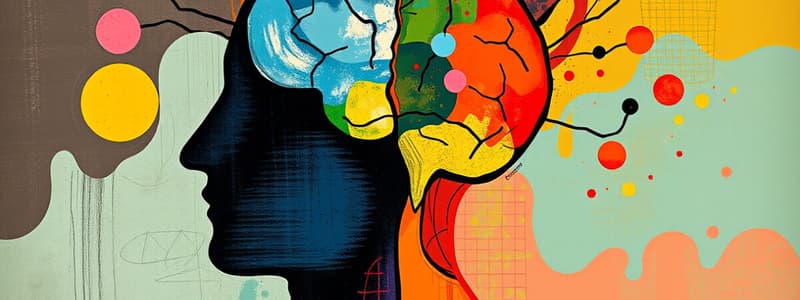Podcast
Questions and Answers
What are attitudes?
What are attitudes?
- Unconscious preferences
- Learned tendencies to like or dislike specific things (correct)
- Things that happen naturally
- Inherited traits
What is attribution?
What is attribution?
The reason someone gives to explain his or her own behavior or experiences, or the behavior or experiences of others
The ______ fallacy refers to ignoring general information in favor of specific information.
The ______ fallacy refers to ignoring general information in favor of specific information.
Base rate
What is cognitive dissonance?
What is cognitive dissonance?
What is confirmation bias?
What is confirmation bias?
What is consensus in social psychology?
What is consensus in social psychology?
What does consistency refer to in behavior?
What does consistency refer to in behavior?
What is dispositional attribution?
What is dispositional attribution?
What does distinctiveness mean in social behavior?
What does distinctiveness mean in social behavior?
What is the fundamental attribution error?
What is the fundamental attribution error?
What is the representativeness heuristic?
What is the representativeness heuristic?
What is social cognition?
What is social cognition?
What is self-concept?
What is self-concept?
What is self-efficacy?
What is self-efficacy?
What is self-esteem?
What is self-esteem?
What is a self-fulfilling prophecy?
What is a self-fulfilling prophecy?
What does situation attribution refer to?
What does situation attribution refer to?
What is conformity?
What is conformity?
What is deindividuation?
What is deindividuation?
What is group polarization?
What is group polarization?
What is groupthink?
What is groupthink?
What is informational influence?
What is informational influence?
What is minority influence?
What is minority influence?
What is normative influence?
What is normative influence?
What is obedience?
What is obedience?
What is social facilitation?
What is social facilitation?
What is social impairment?
What is social impairment?
What is altruism?
What is altruism?
What is attachment according to Zick Rubin?
What is attachment according to Zick Rubin?
What is caring according to Zick Rubin?
What is caring according to Zick Rubin?
What is compassionate love according to Elaine Hatfield?
What is compassionate love according to Elaine Hatfield?
What is consummate love according to Robert Sternberg?
What is consummate love according to Robert Sternberg?
What defines friendship as a type of personal relationship?
What defines friendship as a type of personal relationship?
What is infatuation in Sternberg's theory?
What is infatuation in Sternberg's theory?
What is intimacy according to Zick Rubin?
What is intimacy according to Zick Rubin?
What is love?
What is love?
What is the mere exposure effect?
What is the mere exposure effect?
What is passionate love according to Elaine Hatfield?
What is passionate love according to Elaine Hatfield?
What is prosocial behavior?
What is prosocial behavior?
What is proximity in social relationships?
What is proximity in social relationships?
What is reciprocal liking?
What is reciprocal liking?
What is romantic love in Sternberg's theory?
What is romantic love in Sternberg's theory?
What is similarity in social relationships?
What is similarity in social relationships?
What is Sternberg's Triangular Theory of Love?
What is Sternberg's Triangular Theory of Love?
What is utilitarian value in social relationships?
What is utilitarian value in social relationships?
What is the contact hypothesis?
What is the contact hypothesis?
What is discrimination?
What is discrimination?
What is ingroup bias?
What is ingroup bias?
What is ingroup solidarity?
What is ingroup solidarity?
What is intergroup conflict?
What is intergroup conflict?
What is a jigsaw classroom?
What is a jigsaw classroom?
What is outgroup derogation?
What is outgroup derogation?
What is the outgroup homogeneity effect?
What is the outgroup homogeneity effect?
What is prejudice?
What is prejudice?
What was the Robbers Cave Experiment?
What was the Robbers Cave Experiment?
What is scapegoat theory?
What is scapegoat theory?
What was the Stanford Prison Experiment?
What was the Stanford Prison Experiment?
What is stereotyping?
What is stereotyping?
What are superordinate goals?
What are superordinate goals?
Study Notes
Attitudes and Attribution
- Attitudes: Learned tendencies influencing preferences or dislikes towards various aspects of life.
- Attribution: Explanations individuals assign to their own behaviors or the behaviors of others.
Cognitive Biases and Heuristics
- Base Rate Fallacy: Involves ignoring the statistical base rates when assessing probabilities.
- Cognitive Dissonance: The mental discomfort experienced when holding conflicting beliefs or attitudes.
- Confirmation Bias: Seeking only information that aligns with existing beliefs, reinforcing those biases.
- Fundamental Attribution Error: Overestimating personal qualities and underestimating situational factors when evaluating others' behaviors.
Social Perception Dynamics
- Consensus: Occurs when a large group shares a similar response to a situation.
- Dispositional Attribution: Attributing actions or experiences to an individual's inherent qualities.
- Distinctiveness: Highlights unique responses an individual shows compared to others in similar contexts.
Group Behavior and Influence
- Conformity: Adopting behaviors or attitudes of peers due to actual or perceived pressure.
- Deindividuation: A state of reduced self-awareness and anonymity within a group context.
- Group Polarization: The amplification of extreme positions within a group discussion.
- Groupthink: The tendency to suppress dissenting viewpoints to maintain group cohesion.
Influences in Social Interaction
- Informational Influence: Aligning with a group because of perceived knowledge superiority by others.
- Normative Influence: Conforming to fit in and avoid social disapproval or conflict.
- Minority Influence: The impact that a smaller group can have on the majority or on group decision-making.
Social Facilitation and Impairment
- Obedience: Complying with directives from an authority figure.
- Social Facilitation: Improved performance when being observed by others.
- Social Impairment: Decreased performance when in the presence of others.
Theories of Love
- Compassionate Love: Characterized by deep caring and life intertwining, with low passion.
- Consummate Love: Incorporates intimacy, passion, and commitment, representing a balanced love.
- Infatuation: High passion but lacks intimacy and commitment, often seen as fleeting.
- Romantic Love: Features intimacy and passion but lacks a sense of commitment.
Social Relationships and Connection
- Friendship: A relationship marked by trust, empathy, and a desire to support each other.
- Proximity: Physical closeness increases the likelihood of forming friendships.
- Reciprocal Liking: Mutual liking between individuals, often correlating with relationship strength.
- Similarity: Shared interests and values enhance relationships between individuals.
Social Prejudice and Group Dynamics
- Prejudice: Unjust and negative attitudes directed toward a specific group or its members.
- Discrimination: Negative actions or behaviors targeted at individuals based on group membership.
- Ingroup Bias: Fostering positive feelings towards one's own social group.
- Outgroup Derogation: Negative attitudes towards members of groups considered different.
Research Studies on Group Behavior
- Robbers Cave Experiment: Demonstrated how conflict arises and can be resolved between groups through shared objectives.
- Stanford Prison Experiment: Explored the psychological effects of perceived power, focusing on role-play dynamics between prisoners and guards.
Theories of Conflict and Cooperation
- Scapegoat Theory: Attributing one’s failures or problems to an external group as a diversion.
- Superordinate Goals: Shared objectives that facilitate cooperation and reduce intergroup conflicts.
- Contact Hypothesis: Interaction between hostile groups can reduce prejudice, provided the groups hold equal status and work together on shared tasks.
Stereotyping
- Stereotyping: The act of applying one or more simplistic characteristics to an individual, often overlooking their unique traits.
Studying That Suits You
Use AI to generate personalized quizzes and flashcards to suit your learning preferences.
Description
These flashcards cover key concepts in psychology, focusing on attitudes, attribution, cognitive dissonance, and the base rate fallacy. Perfect for exam preparation and enhancing your understanding of psychological principles. Study efficiently and boost your knowledge with these helpful definitions.




